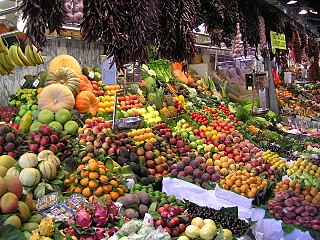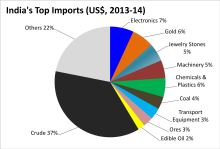The labor theory of value (LTV) is a theory of value that argues that the exchange value of a good or service is determined by the total amount of "socially necessary labor" required to produce it. The contrasting system is typically known as the subjective theory of value.

In economics, a commodity is an economic good, usually a resource, that specifically has full or substantial fungibility: that is, the market treats instances of the good as equivalent or nearly so with no regard to who produced them.

In Marxist philosophy, commodity fetishism is the perception of the economic relationships of production and exchange as relationships among things rather than among people. As a form of reification, commodity fetishism presents economic value as inherent to the commodities, and not as arising from the workforce, from the human relations that produced the commodity, the goods and the services.
Use value or value in use is a concept in classical political economy and Marxist economics. It refers to the tangible features of a commodity which can satisfy some human requirement, want or need, or which serves a useful purpose. In Karl Marx's critique of political economy, any product has a labor-value and a use-value, and if it is traded as a commodity in markets, it additionally has an exchange value, defined as the proportion by which a commodity can be exchanged for other entities, most often expressed as a money-price.
In political economy and especially Marxian economics, exchange value refers to one of the four major attributes of a commodity, i.e., an item or service produced for, and sold on the market, the other three attributes being use value, economic value, and price. Thus, a commodity has the following:
Labour power is the capacity to do work, a key concept used by Karl Marx in his critique of capitalist political economy. Marx distinguished between the capacity to do work, i.e. labour power, and the physical act of working, i.e. labour. Labour power exists in any kind of society, but on what terms it is traded or combined with means of production to produce goods and services has historically varied greatly.
Simple commodity production, is a term coined by Friedrich Engels in 1894 when he had compiled and edited the third volume of Marx's Capital. It refers to productive activities under the conditions of what Karl Marx had called the "simple exchange" or "simple circulation" of commodities, where independent producers trade their own products to obtain other products in exchange. The use of the adjective simple is not intended to refer to the nature of the producers or of their production, but rather to the relatively simple and straightforward exchange processes involved, from an economic perspective.
The law of the value of commodities, known simply as the law of value, is a central concept in Karl Marx's critique of political economy first expounded in his polemic The Poverty of Philosophy (1847) against Pierre-Joseph Proudhon with reference to David Ricardo's economics. Most generally, it refers to a regulative principle of the economic exchange of the products of human work, namely that the relative exchange-values of those products in trade, usually expressed by money-prices, are proportional to the average amounts of human labor-time which are currently socially necessary to produce them within the capitalist mode of production.
Prices of production is a concept in Karl Marx's critique of political economy, defined as "cost-price + average profit". A production price can be thought of as a type of supply price for products; it refers to the price levels at which newly produced goods and services would have to be sold by the producers, in order to reach a normal, average profit rate on the capital invested to produce the products.
Fictitious capital is a concept used by Karl Marx in his critique of political economy. It is introduced in chapter 25 of the third volume of Capital. Fictitious capital contrasts with what Marx calls "real capital", which is capital actually invested in physical means of production and workers, and "money capital", which is actual funds being held. The market value of fictitious capital assets varies according to the expected return or yield of those assets in the future, which Marx felt was only indirectly related to the growth of real production. Effectively, fictitious capital represents "accumulated claims, legal titles, to future production" and more specifically claims to the income generated by that production.

In economics, economic value is a measure of the benefit provided by a good or service to an economic agent, and value for money represents an assessment of whether financial or other resources are being used effectively in order to secure such benefit. Economic value is generally measured through units of currency, and the interpretation is therefore "what is the maximum amount of money a person is willing and able to pay for a good or service?” Value for money is often expressed in comparative terms, such as "better", or "best value for money", but may also be expressed in absolute terms, such as where a deal does, or does not, offer value for money.

Capital. A Critique of Political Economy. Volume I: The Process of Production of Capital is the first of three treatises that make up Das Kapital, a critique of political economy by the German philosopher and economist Karl Marx. First published on 14 September 1867, Volume I was the product of a decade of research and redrafting and is the only part of Das Kapital to be completed during Marx's life. It focuses on the aspect of capitalism that Marx refers to as the capitalist mode of production or how capitalism organises society to produce goods and services.
In classical political economy and especially Karl Marx's critique of political economy, a commodity is any good or service produced by human labour and offered as a product for general sale on the market. Some other priced goods are also treated as commodities, e.g. human labor-power, works of art and natural resources, even though they may not be produced specifically for the market, or be non-reproducible goods. This problem was extensively debated by Adam Smith, David Ricardo, and Karl Rodbertus-Jagetzow, among others. Value and price are not equivalent terms in economics, and theorising the specific relationship of value to market price has been a challenge for both liberal and Marxist economists.
The value-form or form of value is an important concept in Karl Marx's critique of political economy, discussed in the first chapter of Capital, Volume 1. It refers to the social form of tradeable things as symbols of value, which contrast with their physical features, as objects which can satisfy human needs or serve a useful purpose. The physical appearance or the price tag of a traded object may be directly observable, but the meaning of its social form is not.
Criticisms of the labor theory of value affect the historical concept of labor theory of value (LTV) which spans classical economics, liberal economics, Marxian economics, neo-Marxian economics, and anarchist economics. As an economic theory of value, LTV is widely attributed to Marx and Marxian economics despite Marx himself pointing out the contradictions of the theory, because Marx drew ideas from LTV and related them to the concepts of labour exploitation and surplus value; the theory itself was developed by Adam Smith and David Ricardo. LTV criticisms therefore often appear in the context of economic criticism, not only for the microeconomic theory of Marx but also for Marxism, according to which the working class is exploited under capitalism, while little to no focus is placed on those responsible for developing the theory.
Throughout modern history, a variety of perspectives on capitalism have evolved based on different schools of thought.
Constant capital, is a concept created by Karl Marx and used in Marxian political economy. It refers to one of the forms of capital invested in production, which contrasts with variable capital. The distinction between constant and variable refers to an aspect of the economic role of factors of production in creating a new value.
In Marxian economics, surplus value is the difference between the amount raised through a sale of a product and the amount it cost to manufacture it: i.e. the amount raised through sale of the product minus the cost of the materials, plant and labour power. The concept originated in Ricardian socialism, with the term "surplus value" itself being coined by William Thompson in 1824; however, it was not consistently distinguished from the related concepts of surplus labor and surplus product. The concept was subsequently developed and popularized by Karl Marx. Marx's formulation is the standard sense and the primary basis for further developments, though how much of Marx's concept is original and distinct from the Ricardian concept is disputed. Marx's term is the German word "Mehrwert", which simply means value added, and is cognate to English "more worth".
The socialist mode of production, also known as socialism or communism, is a specific historical phase of economic development and its corresponding set of social relations that emerge from capitalism in the schema of historical materialism within Marxist theory. The Marxist definition of socialism is that of production for use-value, therefore the law of value no longer directs economic activity. Marxist production for use is coordinated through conscious economic planning. According to Marx, distribution of products is based on the principle of "to each according to his needs"; Soviet models often distributed products based on the principle of "to each according to his contribution". The social relations of socialism are characterized by the proletariat effectively controlling the means of production, either through cooperative enterprises or by public ownership or private artisanal tools and self-management. Surplus value goes to the working class and hence society as a whole.
Marxian economics, or the Marxian school of economics, is a heterodox school of political economic thought. Its foundations can be traced back to Karl Marx's critique of political economy. However, unlike critics of political economy, Marxian economists tend to accept the concept of the economy prima facie. Marxian economics comprises several different theories and includes multiple schools of thought, which are sometimes opposed to each other; in many cases Marxian analysis is used to complement, or to supplement, other economic approaches. Because one does not necessarily have to be politically Marxist to be economically Marxian, the two adjectives coexist in usage, rather than being synonymous: They share a semantic field, while also allowing both connotative and denotative differences. An example of this can be found in the works of Soviet economists like Lev Gatovsky, who sought to apply Marxist economic theory to the objectives, needs, and political conditions of the socialist construction in the Soviet Union, contributing to the development of Soviet Political Economy.




